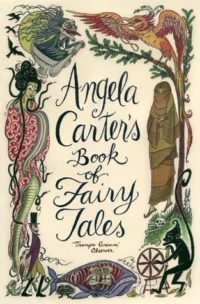The past was hard, cruel and especially inimical to women
 Angela Carter’s Book of Fairy Tales
Angela Carter’s Book of Fairy Tales
I started reading this book on 31 December and finished it this week. It’s not the smallest book, but 450 pages doesn’t usually take me several months. Especially not when it comes from one of the 20th century’s greatest authors, Angela Carter. So what gives?
Well, two things. One: this is a collection of more than 100 short stories, and I do like to spread out short stories by reading one or two per sitting, even when the shortest are less than a page long. Two: perhaps more pertinently, these stories were collected and curated by Carter, not written or even edited by her. So while they share her taste in the weird and feminist, they do not exhibit her writing skill – more noticeably so in some cases than others.
Carter spent many years collecting these stories for what was originally two separate books published by Virago. She sought translations into English, ideally transcriptions from oral storytellers, from all over the world and the result is truly the most international collection I have ever read. For example, the final chapter’s stories are labelled as: Yiddish; Norwegian; Africa: Bondes; USA; Africa: Hausa; Chinese; Surinamese.
The tales are sorted into chapters labelled things like “Good girls and where it gets them” and “Strong minds and low cunning”. The main characters are invariably female and it is almost always a woman who gets the upper hand. There are several variants of familiar tales such as Cinderella or Sleeping Beauty, but most of the stories were new to me. I got the feeling there was a wide span covered from traditional centuries-old folk tales to random off-the-cuff jokes.
These stories are not on the whole any weirder than the fairy tales I grew up with (mostly Grimm and Andersen tales and not the Disneyfied versions), though some of them are. What I actually found more noticeable was how universal some themes are: the daughter being given away as a bride in return for a favour; the ugly monster, animal or tramp turning into a beautiful prince when a lady has shown him a kindness; the step-parent who is resentful of their step-child. Riches and beauty are often rewards, but equally often they are sources of trouble.
I should mention, for the record, that this book is not child-friendly. Not young children anyway. There are some explicit references to sex and some rather brutal outcomes for characters. Older kids would be fine. And it would be remiss of me not to praise the wonderful illustrations by Corinna Sargood, in an old-fashioned woodcut style but not shying away from the often grotesque content. There’s also an insightful introduction by Angela Carter and informative afterword by Marina Warner.
“I don’t offer these stories in a spirit of nostalgia; that past was hard, cruel and especially inimical to women, whatever desperate stratagems we employed to get a little bit of our own way. But I do offer them in a valedictory spirit, as a reminder of how wise, clever, perceptive, occasionally lyrical, eccentric, sometimes downright crazy our great-grandmothers were.”
— Angela Carter
There are some fantastic stories here – in both senses of the word – but there is also just as much misogyny (from characters rather than storyteller) and irritating morality as any fairy-tale collection out there. There are some stories I outright disliked – usually the ones that felt in their style as though they were a silly joke rather than a beloved folk tale. I can see how this is a valuable reference book – a multicultural study of marriage, fertility and women’s place in society – but I can’t see it becoming a favourite collection of mine.
Now that I’ve finished this, it’s time to pick another compilation for my bedside table. The TBR currently includes three options. I might continue the women-led theme with The Story: Love, Loss and the Lives of Women.
Originally published as The Virago Book of Fairy Tales (1990) and The Second Virago Book of Fairy Tales (1992).
This edition published 2005 by Virago Press.
Source: Christmas present from my sister.